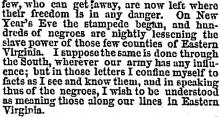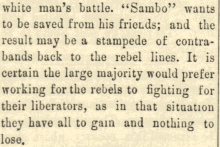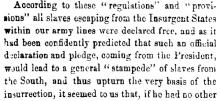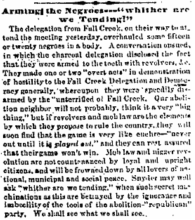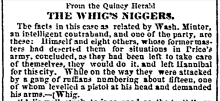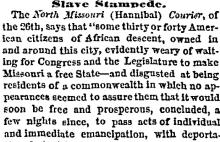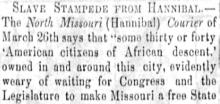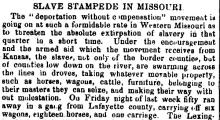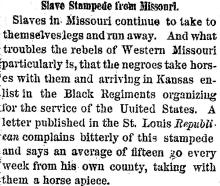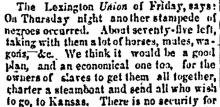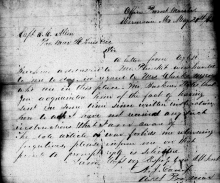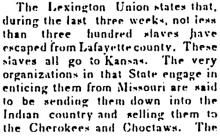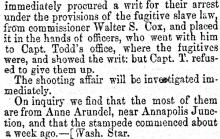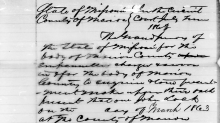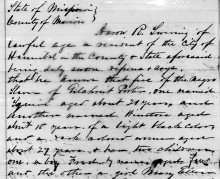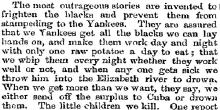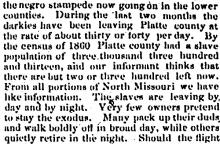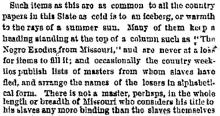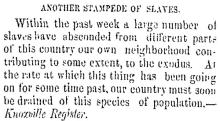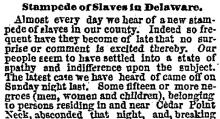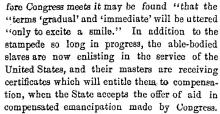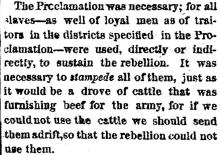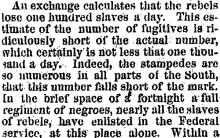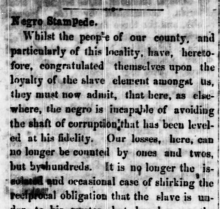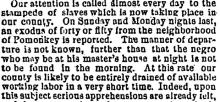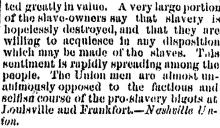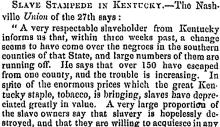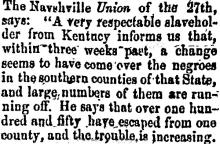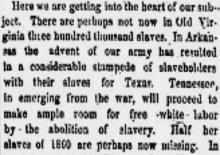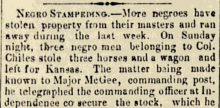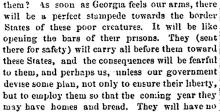View All Documents // 1840s // 1850s // 1860s
Displaying 1051 - 1100 of 1135
FROM BURNSIDE'S ARMY.
Effect of the News from the West––The Weather––The 8th Illinois Cavalry––How the Proclamation Works––Its Effect upon the Rebellion.
[From Our Own Correspondent.]
8TH ILLINOIS CAVALRY, ON PICKET,
KING GEORGE CO., Jan. 11, 1863.
Correspondence of the Republican.
WASHINGTON, Jan. 15.
NEGRO SOLDIERS.
Col. Montgomery, of Kansas, goes to South Carolina with Gen. Hunter, armed with full power to organize a negro army. This office in that Department was spoken of for Gen. Butler, but it appears his Kansas rival had stronger claims.
A "CONFLICT OF AGES."
When the first "proclamation of freedom" was issued on the 22d of September last, unaccompanied as it was with a statement of the considerations which had induced the President to depart from the policy previously prescribed to himself in the conduct of the war, we were tempted, in giving publication to the paper, to adopt the following hypothesis on the subject. We quote from the Intelligencer of last September 23d:
NEGROES AS SOLDIERS. A correspondent of the New York Times, who writes from Lake Providence, Fed. 25, describes a complete stampede of negroes, old and young, from the Bayou Macon region, and says that the remaining slaves are a source of more anxiety to the rebels than even the Yankees. Speaking of the fighting qualities of the negroes, the correspondent says:
Arming the Negroes—"whither are we Tending?"
Lagrange, Tenn., March 27th 1863.
Sir I wrote a few days ago asking instructions with regard to the large number of contrabands now finding their way into our Camps–– The evil is a most perplexing one. Whole families of them are stampeding and leaving their masters, and I am applied to daily for the return of those belonging to loyal Masters. I know that our General Orders do not permit me to yield to such applications: but something should be done to shield our service from the charge of furnishing an Asylum to the Servants of loyal men living in districts not affected by the emancipation proclamation. Very Respectfully Your obedt Servt.
Wm Sooy Smith
ARMING THE NEGROES––"WHITHER ARE WE TENDING?"––Under this flaming head the Herald of Tuesday perpetrates the following:
"The delegation from Fall Creek, on their way to attend the meeting yesterday, overhauled some fifteen or twenty negroes in a body. A conversation ensued, in which the charcoal delegation disclosed the fact that they were armed to the teeth with revolvers, &c. They made one or two "overt acts" in demonstration of hostility to the Fall Creek Delegation and Democracy generally, whereupon they were speedily disarmed by the "unterrified of Fall Creek. Our abolition neighbor will not probably, think it a very "big thing," but if revolvers and mob law are the elements by which they propose to rule the country, they will soon find that the game is very like euchre––"never out until it is played out," and they can rest assured that their game won't win."
From the Quincy Herald
THE WHIG'S NIGGERS.
The facts in this case as related by Wash. Minter, an intelligent contraband, and one of the party, are these: Himself and eight others, whose former masters had deserted them for situations in Price's army, concluded, as they had been left to take care of themselves, they would do it, and left Hannibal for this city. While on the way they were attacked by a gang of ruffians numbering about fifteen, one of whom levelled a pistol at Wash's head and demanded his arms.––[Whig.
SLAVE STAMPEDE FROM HANNIBAL. —
RUNAWAY NEGROES––Night before last six negro men, belonging to Judge Olly Williams, living sixteen miles from the city, on the St. Charles rock road, decamped from their master's plantation, taking with them a horse and buggy, a wagon, and two mules, besides one or two other horses. The names of three of them are Jerry, Louis and Nathan. It is supposed they have struck for Illinois "shouting the battle cry of freedom."
STAMPEDE OF SLAVES.––Jerry, Louis and Nathan, slaves of Judge Olly Williams, whose farm is sixteen miles from the city, on the St. Charles Rock road, Saturday night ran off from their master, taking with them his buggy, light wagon, two mules and other property belonging to him.
SLAVE STAMPEDE IN MISSOURI
SLAVE STAMPEDE IN MISSOURI. – The St. Louis News says that that the “deportation without compensation” movement is going on at such a formidable rate in Western Missouri to threaten the absolute extirpation of slavery in that quarter in a short time.
Slave Stampede from Missouri.
Slaves in Missouri continue to take to themselves legs and run away. And what troubles the rebels of Western Missouri particularly is, that the negroes take horses with them and arriving in Kansas enlist in the Black Regiment organizing for the service of the United States. A letter in the St. Louis Republican complains bitterly of this stampede and says an average of fifteen go every week from his own country, taking with them a horse apiece.
The Lexington Union of Friday, says: On Thursday night another stampede of negroes occurred. About seventy-five left, taking with them a lot of horses, males, wagons, — &c. We think it would be a good plan, and an economical one too, for the owners of slaves to get them all together, charters a steamboat and send all who wish to go, to Kansas. There is no security for slaves, and as long as they remain for nothing else.
Office Provost Marshal
Hermann, Mo May 20th/63
Capt C.C. Allen
Pro. Mar St. Louis dis.
Sir
A letter from Eigblt [illegible] Buckner addressed to Mr. Plunket [Clark's overseer] was handed to me today in regard to Mrs Clarks negroes who are in this place. Mr. Buckner states that you acquainted him of the fact of having sent me some time since written instructions how to act. I have not received any such instructions that I am aware of. The late article of war forbids me returning fugitives, please inform me on that point a prompt reply is solicited
I am, Capt very Respectfully Your Obdt Servt
N.J. Camp
Slave Stampede in Missouri
The “deportation without compensation” movement is going on at such a formidable rate in Western Missouri [illegible] to threaten the absolute extirpation of slavery in the that quarter in a short time. Under the encouragement and armed aid which the movement receives from Kansas the slaves, not only of the border counties, but of counties low down on the river, are swarming across the lines in droves, taking whatever moveable property, such as horses, wagons, cattle, furniture, belonging to their masters they can seize, and making their way without molestation. On Friday night of last week fifty runaways in a gang from Lafayette county, carrying off six wagons, eighteen horse, and one carriage.
About sixty slaves ran away on Tuesday last from their respective masters, being near the Annapolis Junction. Messrs. WM. ANDERSON RANDOLPH, ABRAHAM WOODWARD AND CHARLES HAMMOND are the principal losers by this wholesale stampede. They are supposed to have gone to Washington, D.C
The Chicago Telegrams.
CHICAGO, June 8, 1863.
A special despatch from Walnut Hills (near Vicksburg), dated June 2, says:––
General Blair's expedition has returned, without the loss of a man.
Fifty-six miles of country, from the Big Black to the Yazoo, and eleven miles below Yazoo City, were completely scoured by our troops.
Several bridges and a number of grist mills and cotton gins, used to grind corn, were destroyed; also a large quantity of cotton, marked C.S.A.
The country towards the Yazoo is teeming with agricultural riches. Cattle, sheep and hogs abound in all directions.
Flourishing crops of corn, oats, wheat and rye are seen on every side.
Slave Stampede in Maryland.
WASHINTON, JUNE 16. – On Sunday night some slaves in the neighborhood of Annopolis, stampeded taking horses and wagons. They traveled all night and were reinforced till they numbered 72. Yesterday morning they were met by armed patrolmen, who endeavored to stop them, firing upon them when about a mile from ort Meigs. One of the slaves fired in return. The fugitives then separated and fled. So far as known two males and one female slave were killed, and five wounded. The remainder reached Washington.
STAMPEDE OF SLAVES.
On Sunday night some seventy-five slaves, belonging in the neighborhood of South river, Anne Arundel county, and Queen Anne’s, Prince George’s county, Md., stampeded, taking with them a wagon and cart, with horses, and bringing with them a portion of their effects. The party left about 11 o’clock at night, and travelled all night, at various points on the road being reinforced, until the number reached about seventy-five.
STAMPEDE OF SLAVES.
On Sunday night some seventy-five slaves, belonging in the neighborhood of South river, Anne Arundel county, and Queen Anne’s, Prince George’s county, Md., stampeded, taking with them a wagon and cart, with horses, and bringing with them a portion of their effects. The party left about 11 o’clock at night, and travelled all night, at various points on the road being reinforced, until the number reached about seventy-five.
State of Missouri } In the Circuit
County of Marion } Court July Term
1863
The Grand Jurors of the State of Missouri for the body of Marion County empanelled charged & sworn in for the body of Marion County to enquire [illegible] presentment make upon them each present that one John Lock on the. day of March 1863 at the County of Marion aforesaid feloniously then & there did entice decoy & carry away out of this State one slave man belonging to Wm B. Phillips with intent to effect the freedom of the said slave––against the peace & dignity of the State
State of Missouri }
County of Marion }
A Letter form Chaplain Morris of the 8th C.V.
Incidents of the Blackberry Raid---Feelings of the People---How the Blacks Act---Rebel Crops---Results of the Expedition.
The Negro Exodus.
Still they come. Yesterday morning two boat loads of negroes landed near the mouth of Three Mile creek. About fifty of their brethren from this side were on hand, to greet and welcome the new-comers. We understand that a number of the new arrivals propose to place themselves under the fostering care of Uncle Samuel at $10 per month and a good suit of clothes. – Lawrenceville Conservative, 18th,
SLAVERY PASSING AWAY IN MISSOURI AND KENTUCKY. – The St. Joseph (Mo.) Herald contains the following: — “Capt. Woods, sheriff of Platte county, was in the city a few days since, and from him we learned something of the negro stampede now going on in the lower counties. During the last two months the darkies have been leaving Platte county at the rate of about thirty or forty per day. By the census of 1860 Platte county had a slave population of three thousand three hundred and thirteen, and our informant thinks that there are but two or three hundred left now. From all portions of North Missouri we have like information. The slaves are leaving by day and by night. Very few owners pretend to stay the exodus. Many pack up their duds and walk boldly off in broad day, while other quietly retire in the night.
EMANCIPATION PROGRESSING. It is such a common occurrence for the slaves of rebels to run away from their masters in this county, that we have considered it of too little importance to even notice in our columns. But a stampede took place about two weeks ago, that we cannot forbear mentioning. Two of the most valuable negro men, belonging to E.K. Sayre, the rebel delegate from this county to the State Convention, ran away from him, each one taking with him a fine mule. Pear Mr. Sayre, he has our deepest sympathies in his “bereavement”— and may he bear up under it lie a man! Don’t cry, Mr. Sayre, it will all come out right a hundred years hence. You believe in gradual emancipation, Mr. Sayre, but it appears you have little influence over your darkies— some of them at least for in for immediate emancipation without compensation, but with transportation. Do you see it, Mr. Sayre?
STAMPEDE OF SLAVES. Maryland papers say that at the present rapid rate the stampede of slaves from the State will render all talk of Emancipation unnecessary— there will be none to emancipate.
GENERAL NEWS.
In another column we publish, to-day, a Proclamation by PRESIDENT LINCOLN, wherein he suspends the privilege of the writ of habeas corpus in certain cases.
Among the arrivals yesterday, at Boston, was the schooner Owen Beane, from Toledo, via Montreal.
The Boston steamer Plantagenet, from the West Indies, brings us intelligence of the destruction of the flourishing town of Port au Platte by the Spanish fleet. The town is or was the capital of one of the arrondissements of Hayti, located on the north shore, some ten or twelve miles northwest of Santiago.
The city of Buffalo has again been visited by a destructive fire. Several warehouses were destroyed. The estimated loss is about $120,000.
Letter from St. Louis.
[FROM OUR OWN CORRESPONDENT.]
ST. LOUIS, August 23, 1863.
The Negro Exodus from Missouri.
The St. Joseph Herald of late date, says:
EMANCIPATION IN MARYLAND.
[From the Cumberland Civilian and Telegraph.]
EMANCIPATION.
AFFAIRS IN BALTIMORE COUNTY. – We copy the following from the Towsontown Advocate:
Stampede of Negroes. – We understand that a number of slaves have left their owners in the neighborhood of Pikesville recently; in fact, there seems to be a general exodus of them in that portion of the county. If this state of things continue, and it undoubtedly will, in short time there will not be an able bodied slave in that section of the country
Stampede of Slaves in Delaware.
A singular controversy seems to be in progress in Maryland, between the “Union” men and the “Unconditional Union” men. Both parties, as it seems, agree that emancipation in Maryland has become a necessity. All wish heartily that slavery were out of the way, and are willing to agree to measures for being rid of it. One of the wings of the great Union party, however, holds a more advanced position than the other, respecting this question. One believes in immediate emancipation, and the other in some sort of gradual process. All are ready, it is states, to join in Governor Bradford’s plan for a State convention, and all anticipate a general assent to the measures finally agreed upon; but still they differ in opinion as to the proper course to be pursued, and hence comes a newspaper warfare, with cards of explanation, charges, replies, and all the usual incidents of political division.
The black stampede is worse and worse in the South. Slaves have begun to skedaddle from Texas to Mexico.
Slave Stampedes and Slave Soldiers
The following paragraph from the Nashville Union of the 11th puts down the daily loss of slaves to the rebels at a very respectable figure, and shows that they flock to Uncle Sam’s standards with a rush. It says:
UNITED STATES ITEMS.
The New York Evening Post says another fleet is to be sent after Alabama.
Eleven hundred sick soldiers from the Army of the Potomac arrived in Washington last week.
Slave Stampede in Kentucky. – A very respectable slaveholder from Kentucky informs us that, within three weeks past, a change seems to have come over the spirit of the negroes’ dreams in the Southern counties of that State, and large numbers of them are running off. He says that over one hundred and fifty have escaped from one county, and the trouble is increasing. In spite of the enormous prices which the great Kentucky staple, tobacco, is bringing slaves have depreciated greatly in value. A very large portion of the slave-owners say that slavery is hopelessly destroyed, and that they are willing to acquiesce in any disposition which may be made of the slaves. This sentiment is rapidly spreading among the people. The Union men are almost unanimously opposed to the factious and sellers course of the pro-slavery bigots at the Louisville and Frankfort.
SLAVE STAMPEDE IN KENTUCKY. – The Nashville Union of the 27th says:
SLAVE STAMPEDE IN KENTUCKY. – The Nashville Union of the 27th says:“A very respectable slaveholder from Kentucky informs us that, within three weeks past, a change seems to have come over the negroes in the southern counties of that Sate, and large numbers of them are running off. He says that over 150 have escaped from one county, and the trouble is increasing. In spite of the enormous prices which the great Kentucky staple, tobacco, is bringing, slaves have depreciated greatly in value. A very large proportion of the slave owners say that slavery is hopelessly destroyed, and that they are willing to acquiesce in any disposition which may be made of the slaves. This sentiment is rapidly spreading among the people.
Southern Slavery--The Black Race--The Dangers of a Protracted War.
Since those stupendous military operations of last summer which resulted in the complete reopening of the Mississippi river, and since the advance of our Army of the Cumberland to the northern border of Georgia, we have had, from time to time, some startling admissions and complaints from Southern rebel journals of the alarming accessions to the slave population of Alabama, Georgia and South Carolina from the other slave States occupied or invaded by the Union forces.
NEGRO STAMPEDING.––More negroes have stolen property from their masters and run away during the last week. On Sunday night, three negro men belonging to Col. Chiles stole three horses and a wagon and left for Kansas. The matter being made known to Major McGee, commanding post, he telegraphed the commanding officer at Independence co secure the stock, which he did, and sent it to Colonel Chiles by a detachment of the 4th M.S.M., on Wednesday last. The Colonel was in attendance on the Legislature at Jefferson City, and on learning the facts, he immediately telegraphed Gen. Ewing to stop the negroes and put them in the U.S. service, which in compliance with a late order, was done.
Negroes that run off hereafter will do so to some purpose, as most of them will be handed over by their owners to the service.––Lexington [Missouri] Union
MISSOURI ITEMS.
THE HANNIBAL Courier is urging the enterprise of a lyceum, reading-room and lectures in that city.
THE residence of Wm. B. Smott, near Fayette, was lately destroyed by fire, with all the contents.
THE Provost Marshal at Jefferson credits Boone county with some 200 negro recruits.
THE City Hotel, in Lexington, Mo., was destroyed by fire last Wednesday.
SOME sixty negroes, from Randolph, Howard and Macon counties were enlisted at Macon City last week.
A SALOON keeper at Jefferson had twenty barrels of the ardent confiscated last week, for selling liquor to soldiers.
THE sick and wounded at the Military Hospital in Jefferson City are to be regaled with a dinner on Christmas, by Union ladies in this city.
THE SLAVES AS AFFECTED BY THE REBELLION.
The following are extracts from a letter written by a loyal Tennessean to gentleman in this city. They give his views of the condition of the slave as affected by the Rebellion, and will interested many as the opinions of one who had lived for many years in a Slave State and watched the working of the institution through all the recent troubles:
LIMITED LIABILITY IN WAR.
Lord Stanley is reported to have said a clever thing recently, in regard to the speck of war in Europe; he remarked that England was, no doubt, morally responsible to Denmark for a certain amount of physical as well as moral aid, but that what Europe wants is some system of war with limited liability.
[Special Correspondence of the Louisville Journal.]
AFFAIRS IN NORTHERN ALABAMA.
STEVENSON, Feb. 19, 1864.

